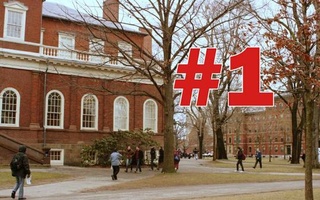
Michael M. Crow, the President of Arizona State University, and a panel participate in a discussion titled "Designing a University for America's Complex Future" at the Harvard Graduate School of Design yesterday.
Michael M. Crow, president of Arizona State University, said that he acknowledged that universities were partially at fault for the United States’ biggest problems during a talk to members of a Harvard Kennedy School program on scientific and technological innovation.
In the address at Piper Auditorium to the Program on Science, Technology, and Society (STS) last night, Crow said that despite these adverse consequences, research universities are the “principal asset for national success.”
“Decline in national competitiveness, math and science educational outcomes diminishing, fossil fuel use greatly expanded, educational attainment decline—all these things I just mentioned, you will be shocked to know that I actually hold the universities accountable for that,” Crow said. “We are part of the problem.”
According to Crow, in the past such schools were hurt by a “lack of differentiation” because they all tried to copy “elite” universities like Harvard.
“But I don’t know if it’s necessarily good for every private university in the United States to think that its mission is to emulate and ultimately topple Harvard as the number one university,” Crow said.
Crow used ASU as an example of a new type of school that he said will augment, rather than copy, the nation’s top universities.
ASU recently took steps to better address needs of its student body, including the creation of the nation’s fist School of Sustainability and the formation of a separate teacher’s college within its school of education, Crow said.
Professor Daniel P. Schrag, director of the Harvard University Center for the Environment, said that Crow’s speech reminded him of what he called the media’s tendency to attack higher education.
“There is a role for the Harvards just as there is a role for Arizona State, and we need both of them,” Schrag said.
James T. Kloppenberg, chair of the Department of History, said that there was once a time when university presidents such as Harvard’s were household names. Now, “the media would rather cover Sarah Palin than they would Drew Faust,” said Kloppenberg.
The lecture was part of the STS Program’s Science and Democracy Lecture Series, which includes talks on the role of science and technology in democracies.
According to Sheila Jasanoff, a Kennedy School professor and the moderator of the event, the subject of Crow’s speech fits the lecture series.
“STS is concerned with knowledge making in all of its forms,” she said, “and that obviously makes universities and their particular role in producing knowledge a key site for STS scholarship and also STS engagement.”
Read more in News
Harvard Scientists Reverse Aging in MiceRecommended Articles
-
Harvard's Image DeclinesHarvard is no longer the American university with the best public standing in the media, according to a report released ...
-
Congress Eyes Tax ExemptionsA new report from the Congressional Budget Office questioned universities’ issuance of tax-exempt bonds, a method Harvard has employed to raise cash over the past years.
-
University Inflation Rate Hits Record LowThe rate of inflation affecting universities nationwide fell to 0.9 percent in fiscal year 2010—the lowest rate on record—and rates for institutions in New England dipped even lower.
-
A Crime-Free CambridgeMore than anything else, the rise of these robberies can be explained, it seems, in plain economic terms.
-
Global Access to Higher Education on the RiseThe director of the Center for International Higher Education at Boston College charted trends in university systems across the globe during a talk Tuesday at Harvard.
-
 Harvard: Prestigiously Number One
Harvard: Prestigiously Number One













